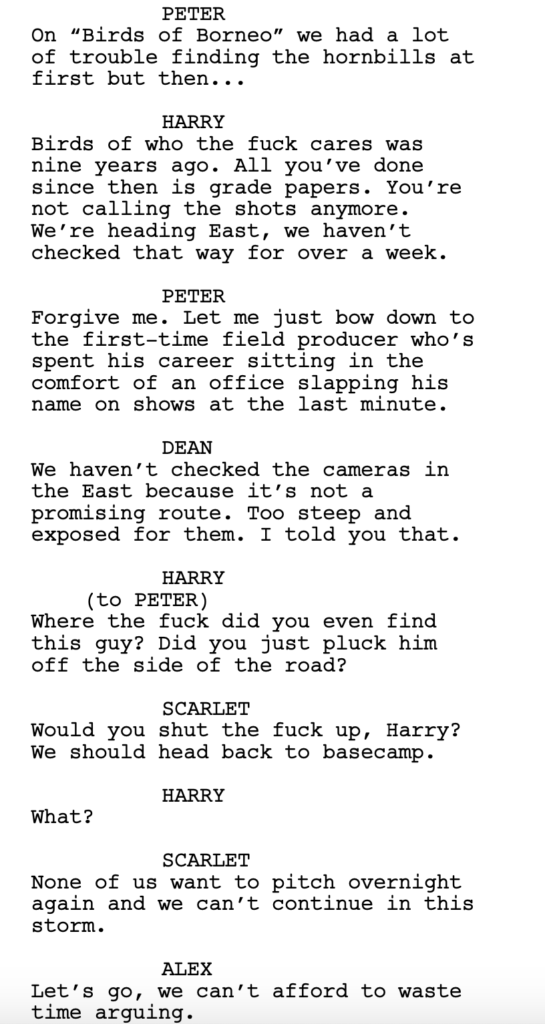The daughter of a big-time screenwriter tries her hand at the family business.
Genre: Mystery/Drama
Premise: A documentary crew in contention at the Emmys for their film about wild Alaskan wolves is hiding several big secrets about their troubled 3 month shoot.
About: We’ve got some screenwriting royalty here. Today’s writer, Rose Gilroy, is the daughter of screenwriter Dan Gilroy and the niece of writer Tony Gilroy. I know what you’re thinking Evil Internet People. “She’s an undeserving Nepo Baby! We must banish her to the nine circles of screenwriting hell!” Well, here’s the way we play it down at Scriptshadow: we do not discriminate. We don’t care where you came from, what your skin color is, or what your sexual orientation is. All we care about is: CAN YOU WRITE?? Let’s see if Rose Gilroy can write.
Writer: Rose Gilroy
Details: 95 pages

Rose Gilroy
One of the reasons I chose the logline, “Personal Statement,” (When her family hires an independent admissions consultant to help craft Ivy League-worthy college application essays, a Chinese-American high school student must fight to control her life story and protect her identity) for this weekend’s Logline Showdown was because I’ve been looking for stuff that’s different.
Don’t get me wrong. I’m the first guy who’ll jump on that clever contained thriller premise or a great horror hook. But I see those all the time. My eyes are now more open to unique concepts, even if they don’t bowl me over.
That’s why I chose to review The Pack today. It’s unique. When’s the last time you watched a movie about a documentary awards show? Of course, you still have to build a hook onto that. And the logline provides us that hook in spades. This crew is hiding something about their shoot. Let’s find out what it is.
It’s the 39th Annual News and Documentary Emmy Awards and producer Harry Shields has his documentary film, “The Pack,” in contention. Harry is here with his director, Peter, his award-winning cinematographer, Alex, his focus puller, 20-something Scarlet, and his young assistant, Eve.
“The Pack” is about a unique family of wolves up in the Yukon Territory in Alaska. And it was actually Eve, a computer genius, who crunched some numbers to discover that this unique pack of wolves existed. If not for her, they’d have no idea where to go. This tiny team, along with a local tracker, spent several months up in freezing temperatures to document this pack of wolves.
The writer plays with the narrative by bouncing back and forth between the awards show and the crew’s time spent in the Yukon. It’s evident early on that the present-day members of the crew don’t get along, and a lot of that is due to what happened during the production.
So when we go back to Alaska, we’re fed little pieces of the experience which gradually fill in these mystery holes. One of the main problems is that Eve’s calculations were wrong. They spend an entire 6 weeks in the Yukon without seeing a single wolf. And the crew, feeling the pressure of all the money spent on the production, starts leveling their anger towards Eve, who’s so young and inexperienced, she’s emotionally ill-equipped to handle the attacks.
There’s also the question of what happened to the financier of the film. Although he’s alive and well in the Yukon, he’s since passed away by the time of the awards show. This entire situation creates several intriguing questions. What happened to the financier? How did they create an award-winning documentary when it looks like they weren’t able to find any wolves? And what happened to Eve on that trip, who looks like an utterly broken human being at the awards show?
I can now assure everyone: Rose Gilroy is legit.
The cleverness of the way this narrative unfolds – with the cutting back and forth – creates an unpredictable, as well as exciting, read. We’re always champing at the bit to get back to the Yukon so we can learn just a little bit more about what happened back there.
Also, it should be noted that this is not a GSU script. GSU stands for Goal, Stakes, Urgency. There is no goal here. I mean, I guess the goal is to find the wolves. But that’s not what the movie is about. The movie is about what happens to people when they don’t get what they want. When the pressure builds up and you’re stuck in the middle of nowhere with a highly frustrated group.
Instead, the narrative is driven by mystery. While I’ll always champion a high-stakes GOAL as the best way to power a screenplay, a really solid mystery is almost as good. But that’s the key. It has to be a SOLID MYSTERY. It can’t be some dumb generic mystery. That’ll never compete with a goal-driven script.
Which is what I liked most about this. Most mysteries are the same – someone gets murdered and we try to find out whodunnit. That’s like 95% of TV and movie mysteries. So if you can come up with a strong mystery that has nothing to do with that, you’ve got something special. Which is exactly what The Pack is.
You can also see the influence of having an award-winning screenwriter as your guide. This is not a traditional narrative. It’s a parallel narrative. We’re jumping back and forth between time periods. This creates a different rhythm to the story. It provides unique opportunities for plot reveals that you wouldn’t be able to pull off in a sequential story. And it just feels smarter. I know that sounds dumb. But it does.
The Pack also provides us with a great dialogue tip. Which is that your dialogue jumps up several levels whenever you introduce tension. Tension gets people feisty. And when people get feisty, they say way more interesting stuff. That little jab that you’ve been keeping to yourself? When the tension ratchets up, you might not keep that jab to yourself. So you want to introduce tension – naturally of course – whenever you can.

When it comes to mysteries, nothing really matters unless the big reveal is great. But The Pack actually taught me something new about reveals. Because The Pack doesn’t have a show-stopper “Sixth Sense” reveal. The reveal is more character-driven. Which makes it more impactful.
I don’t want to spoil it but, basically, these characters are given a choice at the end. And it’s a choice we kind of saw coming. But because each character has been set up so well, we’re invested in what they’re going to choose to do. And there’s an additional component of, will they all have different choices, or will their choice be made as a “pack?” That’s what makes the ending so strong.
I definitely recommend this. One of the best scripts I’ve read so far this year. It’s a Black List script so it’s out there if you’re looking for it.
[ ] What the hell did I just read?
[ ] wasn’t for me
[ ] worth the read
[x] impressive
[ ] genius
What I learned: Scripts always feel smarter when you can create a metaphor for your characters that matches the subject matter. They’re going out to observe a pack of wolves. But they are, themselves, a pack. And, in the end, they’re more like the wolves than the wolves are.

